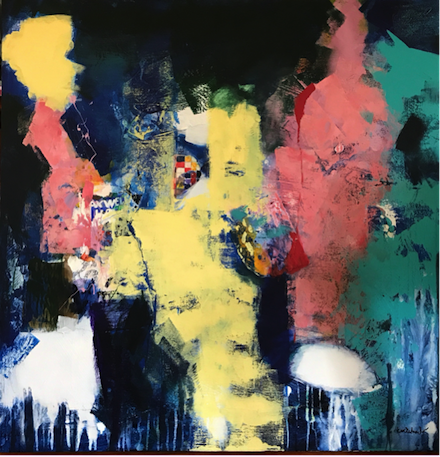
|
|
|
|
|
| Issue 3: | May 2020 |
| Tanka Prose: | 284 words |
By Charles D. Tarlton
It Looks Like Manet to Me
Art never can be imitation.
—Hans Hofman1
The mind, in some way I don’t fully understand, takes in the black marks on a page, recognizes marks, letters, and words and then imagines and connects sounds, images, meanings, and memories. The reader has to believe something similar (but backwards) went on in the mind of the writer. That’s how we read; no matter how certain it feels, it’s taking a lot for granted.
amidst the whorls
of paint covering the de Kooning
on the wall, the old
man, leaning slightly on his umbrella
announces he’s seen a lighthouse
So, maybe we shouldn’t be looking for things in paintings, even when they bear titles like Picasso’s Les Demoiselles d’Avignon or Van Gogh’s Aardappeleters, but looking instead for rhythms, echoes (how the tiny bit of red draws the pink and yellow to it), or the oscillations between boundary and non-boundary.
if, in the midst
of undecipherable scratchings
you suddenly saw
colorful squares in a pattern
by Klee, you’d know what?
These rough-edged shapes and obscure images that show through constitute the evidence of the painter’s urges and movements, her wondering across the canvas, where she hesitated, then resumed, and, after that began an attack. The eye wants to follow, but the artist senses that and interrupts, throwing the eye off the scent and into another temptation.
she says thunderstorm
and I try to remember it
the lightning flash
over before it began, the colors
made up in your mind’s eye

Thursday Night Thunderstorm (2017)
by Ann Knickerbocker 2
~ Coda ~
I live with this painting
hanging on the wall across from my chair
my eye slithers
among the colors and layers, carried
along by their relentless motion
Publisher’s Notes:
1. Quotation by German-born American painter Hans Hofmann (1880–1966 ) is from
HansHofman.net (link retrieved on 26 April 2020):
https://www.hanshofmann.net/quotes.html
“What goes
on in abstract art is the proclaiming
of aesthetic principles... It is in our own time that we have become aware of pure
aesthetic considerations. Art never can be imitation.”
2. Thursday Night Thunderstorm (mixed-media painting: acrylic, collage,
house paint on canvas) by American abstract painter Ann Knickerbocker is copyrighted
© 2017 by the artist. All rights reserved. Painting is reproduced here with her
permission.
Ann Knickerbocker
Please visit www.annknickerbocker.com for details about the artist, and links to her galleries and her blog Artist in an A-frame.
Charles D. Tarlton
is a retired university professor of political theory who lives in Old Saybrook, Connecticut with his wife, Ann Knickerbocker, an abstract painter, and a Standard Poodle named Nikki. He is the author of three books of prosimetra published by KYSO Flash Press: Touching Fire: New and Selected Ekphrastic Prosimetra (2018), Get Up and Dance (2019), and Carmody & Blight: The Dialogues (2019).
Tarlton has been writing poetry and flash fiction since 2006, and his work is published in: Abramelin, Atlas Poetica, Barnwood, Blackbox Manifold, Blue and Yellow Dog, Contemporary Haibun Online, Cricket Online Review, Dark Matter, Fiction International, Haibun Today, Inner Art Journal, Jack Magazine, KYSO Flash, Linden Avenue Literary Journal, Muse India, Prune Juice, Rattle, Red Booth Review, Review Americana, Ribbons, Shampoo, Shot Glass, Simply Haiku, Six Minute Magazine, Sketchbook, Skylark, The Ekphrastic Review, tinywords, Tipton, Unbroken Journal and Ink, Sweat, and Tears.
He also has a poetry e-chapbook published in the 2River series, La Vida de Piedra y de Palabra: Improvisations on Pablo Neruda’s Macchu Picchu; a poem sequence in Lacuna entitled Five Episodes in the Navajo Degradation; and “The Turn of Art,” a short poetical drama pitting Picasso against Matisse, composed in verse and prose, which appeared in Fiction International.
More on the Web: By, About, and Beyond
⚡ Artifact With Steam (2019) by Ann Knickerbocker, ekphrastic tanka prose in the e-collection Get Up and Dance featured in KYSO Flash (Issue 12, Summer 20189)
⚡ Featured Author Charles D. Tarlton, with six of his ekphrastic tanka prose and an interview with Jack Cooper, in KYSO Flash (Issue 6, Fall 2016)
⚡ Notes for a Theory of Tanka Prose: Ekphrasis and Abstract Art, a scholarly paper by Tarlton residing in PDF at Ray’s Web; originally published in Atlas Poetica (Number 23, pages 87-95)
⚡ Three American Civil War Photographs: Ekphrasis by Tarlton in Review Americana (Spring 2016)
⚡ Simple Tanka Prose for the Seasons, a quartet by Tarlton in Rattle (Issue 47: Tribute to Japanese Forms, Spring 2015)
| Copyright © 2019-2025 by MacQueen’s Quinterly and by those whose works appear here. | |
| Logo and website designed and built by Clare MacQueen; copyrighted © 2019-2025. | |
|
Data collection, storage, assimilation, or interpretation of this publication, in whole or in part, for the purpose of AI training are expressly forbidden, no exceptions. |
At MacQ, we take your privacy seriously. We do not collect, sell, rent, or exchange your name and email address, or any other information about you, to third parties for marketing purposes. When you contact us, we will use your name and email address only in order to respond to your questions, comments, etc.